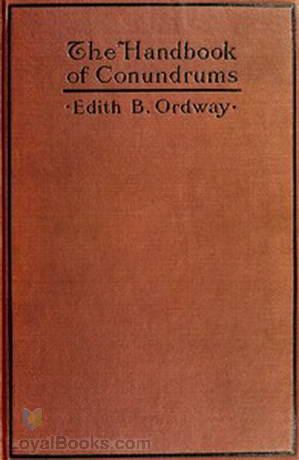|
Books Should Be Free Loyal Books Free Public Domain Audiobooks & eBook Downloads |
|
|
Books Should Be Free Loyal Books Free Public Domain Audiobooks & eBook Downloads |
|
The Handbook of Conundrums By: Edith B. Ordway (1877-) |
|---|

The Handbook of Conundrums by Edith B. Ordway is a captivating and intellectually stimulating collection of puzzles, brain teasers, and riddles. This book presents a wide array of conundrums that challenge readers to engage in analytical thinking and problem-solving skills.
One of the book's greatest strengths is its diversity of conundrums, ensuring that readers of all ages and interests will find something intriguing within the pages. From classic riddles that have perplexed generations to modern brain teasers, the author encompasses a wide range of conundrums that are sure to captivate and entertain.
Edith B. Ordway's clear and concise explanations accompanying each puzzle make it accessible and enjoyable for readers at any level. Each conundrum is presented with a unique twist, often providing alternative perspectives that require readers to think outside the box. The author's ability to seamlessly blend humor and wit into these explanations adds an extra layer of enjoyment to the reading experience.
What sets this book apart from other puzzle compilations is its organization. The Handbook of Conundrums is divided into different sections, each dedicated to a distinct type of puzzle. This thoughtful arrangement allows readers to navigate through the book easily and choose puzzles that align with their interests or desired level of challenge.
Furthermore, the book's emphasis on fostering critical thinking and problem-solving skills makes this an exceptional resource for students, educators, or anyone looking to sharpen their mental acuity. The conundrums range from straightforward and quick puzzlers to elaborate scenarios that require careful analysis. Each challenge serves as an excellent exercise to enhance logical reasoning, decision-making, and creativity.
While the Handbook of Conundrums provides a stimulating and enjoyable experience for readers, it is important to note that some conundrums may be familiar to puzzle enthusiasts. However, the author manages to infuse a fresh perspective into even the most well-known riddles, ensuring that this collection has something new to offer to anyone willing to delve into its pages.
Overall, The Handbook of Conundrums by Edith B. Ordway is an engaging and thought-provoking book that promises hours of entertainment for fans of puzzles and riddles. With its diverse range of challenges, humor-infused explanations, and focus on fostering critical thinking, this book stands as an exceptional resource for mental stimulation and an enjoyable pastime. Whether you are a puzzle aficionado or simply looking to exercise your brain, this handbook is certain to amuse, challenge, and satisfy. THE HANDBOOK OF CONUNDRUMS BY EDITH B. ORDWAY Author of "The Etiquette of To day," and "Synonyms and Antonyms." NEW YORK GEORGE SULLY AND COMPANY Copyright, 1914, by SULLY and KLEINTEICH Copyright, 1915, by SULLY and KLEINTEICH All rights reserved PRINTED IN U. S. A. PREFACE This book presents a grindstone whereon the reader may whet his wits. It is of sufficient hardness to resist the coarsest metal of broad bladed humor, and of sufficient fineness of grain to edge the best steel of fancy. Like all grindstones, though its form is new, its ingredients are of remote origin. It has whetted many English and American blades for the battle of ideas, and is, therefore, in places, somewhat worn. There is, however, much absolutely fresh surface. Any blade of fine temper properly ground upon it is warranted to cleave to the dividing asunder of such subtle distinctions as that between humorsome stupidity and precise wit, and that between the wit of laughter only and the wit of insight. |
| This book is in genre |
|---|
| Literature |
| eBook links |
|---|
| Wikipedia – Edith B. Ordway |
| Wikipedia – The Handbook of Conundrums |
| eBook Downloads | |
|---|---|
|
ePUB eBook • iBooks for iPhone and iPad • Nook • Sony Reader |
Kindle eBook • Mobi file format for Kindle |
|
Read eBook • Load eBook in browser |
Text File eBook • Computers • Windows • Mac |
| Review this book |
|---|